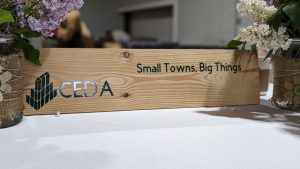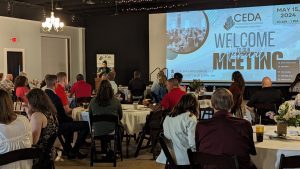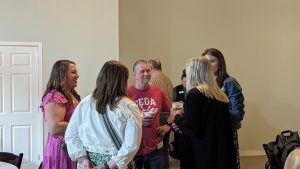By Joshua Schuetz

The future of economic development in rural Minnesota and Iowa took center stage at CEDA’s annual meeting this May. Held at the 10 Talents Arts Center in Blue Earth, the gathering celebrated CEDA’s achievements and ongoing efforts to boost opportunities in rural America.
Presentations from CEDA team members serving six different communities addressed a range of topics, including tax abatement, business consulting, and capacity building.
Amy Schaefer and Jennifer Howard shared a collaborative initiative by Winnebago, Blue Earth, and Faribault County to establish a tax abatement program for new housing. This program aims to address the critical shortage of new homes across these communities. They emphasized the importance of community collaboration in tackling the complex challenges of economic development.

Sarah Carling, representing Itasca County, highlighted CEDA’s expansion efforts in northern Minnesota. Carling discussed the region’s key industries—tourism, timber, and taconite—and how COVID-19 impacted resort communities. She detailed how CEDA has helped these communities build economic development capacity, positioning them to better manage their futures.
Jason Passmore and Spiff Slifka, representing Howard County, Iowa, described CEDA’s expansion efforts south of Minnesota. In Howard County, CEDA has integrated economic development, tourism, and Chamber of Commerce boards into a single organizational structure. This consolidation has led to improved efficiency, more engaged board members, stronger organizational capacity, and streamlined processes.
Over the past year, CEDA has launched new programs to support small businesses and communities. Two of these initiatives, the Rural Business Innovation Lab and the Rural Capacity Program, were showcased at the meeting.
Cameron Payne presented on the Rural Business Innovation Lab (RBIL), a cohort-based entrepreneurship consulting initiative targeting scalable businesses in the natural resources industry. Payne announced RBIL’s second cohort of 11 businesses and highlighted the program’s tailored approach, which includes workshops on various aspects of business management, one-on-one consulting, and networking opportunities.

Amy Schaefer and Vice President Chris Giesen introduced the Rural Capacity Program (RCP). This initiative supports small communities that cannot afford economic development initiatives on their own. Funded by the state of Minnesota, RCP has been implemented in 18 cities, focusing on business retention and expansion, revolving loan fund creation, commercial rehabilitation, and childcare.
In his closing remarks, CEDA CEO/President Ron Zeigler praised the efforts of CEDA staff and sponsors. Compeer Financial generously awarded an additional $250,000 to support CEDA’s mission to enhance the future of rural America and further CEDA’s mission of helping small communities do big things. This $250,000 award followed an award of $1 million at last year’s annual meeting.
